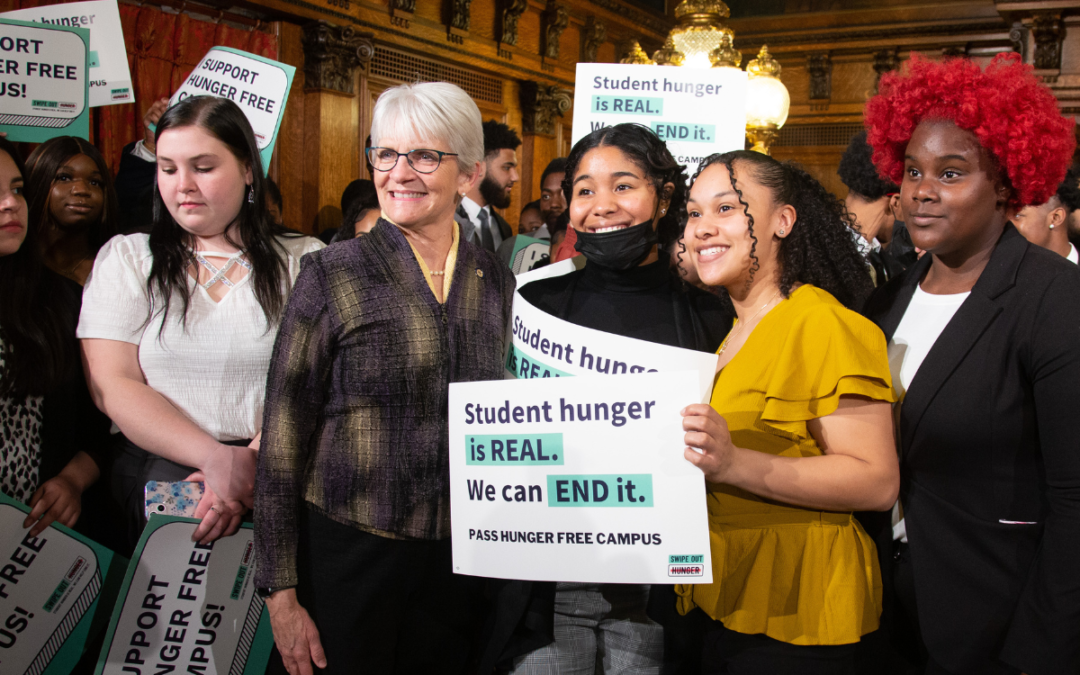West Chester, Pa (January 12, 2023) – West Chester University (WCU) is one of the first recipients of funding through Pennsylvania’s Hunger-Free Campus Initiative, a new program aimed at combatting student hunger on campus, said state Senator Carolyn Comitta.
“West Chester University is a leader in addressing food and basic needs insecurity on campus. And with these additional resources we will continue to work together to ensure that no student must go hungry to access the dream of higher education,” said Comitta, a WCU alumnus and member of the Senate Education Committee. “I am proud of West Chester and all the institutions of higher education that are taking steps to ensure that all students have access to the nutritious food and other necessities they need to learn, grow, and thrive.”
WCU was awarded more than $54,000 in state grant funding through the program, which Committed championed and successfully worked to secure a $1 million allocation for in this year’s state budget. The initiative is based on legislation introduced in the state Senate by Comitta and in the state House by Representatives Malcolm Kenyatta and Jennifer O’Mara.
“I am very grateful to First Lady Frances Wolf and key legislators including Senator Carolyn Comitta and Representatives Jennifer O’Mara and Malcolm Kenyatta for their leadership in elevating the issue of college student food insecurity. The funding we have been awarded through the PA Hunger Free Campus Grant will allow WCU to expand our capacity to serve students experiencing food insecurity through additional programs and infrastructure both on our main campus and at our satellite campus in Philadelphia. I am also hopeful that moving forward Governor Shapiro and the new legislature will continue to prioritize this critical social justice issue,” said Ashlie Delshad, a WCU professor and a founder of the WCU Campus Community Garden.
At WCU, students can access the Campus Resource Pantry, which offers non-perishable food, fresh produce from campus gardens, personal care items, school supplies, and winter and career clothing. It is open to all undergraduate and graduate students regardless of need level.
“WCU has been a leader in the state of Pennsylvania when it comes to taking action to address the issue of college student food insecurity; however, student need continues to outpace campus resources and food price inflation has further compounded this problem. Consistent with national averages, a quarter to a third of WCU students experience food insecurity and students who identify as female, as LGBTQ+, as Black or as Latinx are all at heightened risk of experiencing food insecurity,” Delshad said.
Last summer, Pennsylvania First Lady Frances Wolf unveiled the Hunger-Free Campus Initiative, featuring the PA Hunger-Free Campus and PA Hunger-Free Campus+ designations, to build a coalition of Pennsylvania institutions of IHEs focused on addressing hunger and other basic needs for their students, creating opportunities for connection among student hunger advocates, providing resources and strategies for campuses, and supporting opportunities to apply for grants related to addressing food insecurity.
“With more than a third of students knowing someone who dropped out of college due to food insecurity during the pandemic, hunger affects far too many postsecondary students across the nation,” said Gov. Wolf. “The PA Hunger-Free Campus designation and grant program gives Pennsylvania’s colleges and universities the tools they need to combat hunger on their campuses and provide students with access to healthy food so they can stay focused, learn, and grow.”
Through the 2022-2023 PA Hunger-Free Campus Grant Program, colleges with the PA Hunger-Free Campus or PA Hunger-Free Campus+ designation applied for competitive funding in an amount up to:
- $20,000 for institutions with 3,000 or fewer learners;
- $40,000 for institutions with 3,001 to 7,000 learners; and
- $60,000 for institutions with 7,001 learners or more.
Postsecondary institutions that received a PA Hunger-Free Campus+ designation implemented additional innovative solutions to address student hunger and other basic needs for their campus community in conjunction with demonstrating additional criteria. Examples of these initiatives included offering a variety of meal plans, including an option that provides ten or fewer meals weekly to avoid interfering with SNAP eligibility, creating or implementing meal-sharing programs, educating student leaders on campus to develop student-centered programs, or facilitating innovative community partnerships.
“Hunger should never be what holds someone back from taking steps to invest in their future – and the future of Pennsylvania. From high school graduates pursuing career pathways to adults making career changes and adapting to shifts in workforce needs, students deserve proper support in achieving their higher education goals,” said First Lady France Wolf. “I’m proud that the Hunger-Free Campus program can offer that support and look forward to seeing the innovative ways that schools address food insecurity on their campuses.”
The grants are awarded to address food insecurity on campus, including expanding access to food options, creating awareness initiatives, and upgrading facilities. Awardees will be able to utilize the grant funds until December 31, 2023.
The PA Hunger-Free Campus designations are reopened and institutions can apply. Designees receive a certificate of recognition and placement on the PA Hunger-Free Campus website, and they also have an opportunity to apply for future grant opportunities.
###

